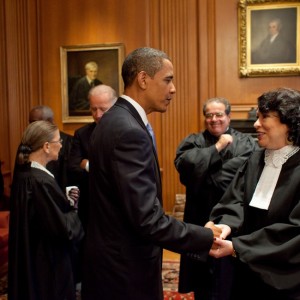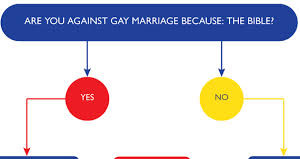As longtime readers know, I used to be a lawyer before entering seminary to prepare for the Catholic priesthood. It’s perhaps unsurprising, then, that I’m fascinated by questions about the “burden of proof” in religious questions. For example, does the burden of proof fall on the believer or the atheist? What sort of evidence is permissible to meet this burden of proof? Do “extraordinary” claims require extraordinary evidence? Should they meet an extraordinary burden of proof, above the burden required for other sorts of claims? Here are four ways that those questions are answered incorrectly.
Tag: reason
No, the Supreme Court Didn’t Just Legalize Gay Marriage.
One of the biggest news stories this summer has been the Supreme Court’s 5-4 decision last month in Obergefell v. Hodges which both declared gay marriage legal, and a constitutional right. Given this, both fans and opponents of the ruling have spoken of it as “legalizing” gay marriage nationwide. But it hasn’t. And it hasn’t, because it can’t, because the Supreme Court doesn’t have the power to do what it claims to have done.
Can God Be Known?
Can we actually know anything about God? This is one of the most fundamental questions, and many people, particularly agnostics, will say “no.” The argument tends to go something like this: God, if there is a God, is so far removed from human experience and knowledge that there’s nothing that we can say about Him (or Her… Continue reading Can God Be Known?
About those Gay Marriage Flow Charts…
There are several flow charts trying to show the ridiculousness of religious opposition to same-sex marriage by making three claims: (1) Leviticus forbids homosexuality, but it also bans a bunch of other stuff, and nobody [a.k.a., no Gentile] actually lives by all those rules; (2) Paul seems to forbid homosexuality, but actually means something like temple prostitution; and (3) Jesus doesn’t mention homosexuality. Here’s why none of those arguments work.
Weak T: Transgenderism’s Philosophical Weaknesses
A lot’s been said about the case of Olympic decathalon Bruce Jenner’s decision to undergo a “sex change” operation, and to call himself “Caitlyn.” Unfortunately, a good deal of it has been sound and fury, signifying nothing: either cruel jokes at Jenner’s expense, or accusations of bigotry for anyone who hasn’t hopped on the transgender bandwagon. A better approach would be to soberly consider the underlying philosophical problems raised by transgenderism, and then suggest a positive way of responding to trans-identifying people. So that’s what I’ve tried to do here, beginning with:
Abortion, Souls, and the Atheist Conundrum
Do You Need God to Know That Abortion is Wrong? That’s a question that I asked recently here and over at Strange Notions. I was prompted by two things: on the one hand, a series of articles defending the idea that we can be moral without God; and on the other, articles like this one, suggesting that… Continue reading Abortion, Souls, and the Atheist Conundrum
Is Religion Responsible for the World’s Violence?
Sébastien Mamerot, Second Battle of Ramla, from Les Passages d’Outremer (1475) Last week, a “gun-toting atheist” and self-proclaimed “anti-theist” killed three Muslims in Chapel Hill, North Carolina. There’s some question still about whether the killer was motivated by atheism or some other motivation. What there’s no question of is that much of the secular response was predictably… Continue reading Is Religion Responsible for the World’s Violence?
Reason #9 to Reject the Reformation: Logical Fallacies
It’s wrong to pray to Saints because we should only worship God. Good works are irrelevant for salvation because we aren’t saved by works of the Law. New Testament presbyters aren’t priests, because “presbyter” just means “elder.” And in any case, we don’t need an order of priests, because Scripture says we’re all priests. And… Continue reading Reason #9 to Reject the Reformation: Logical Fallacies
How to Perfectly Know the Existence of God
St. Thomas Aquinas’ Summa Theologiae It’s common today to hear both believers and nonbelievers claim that the existence of God is ultimately unknowable, or at least unprovable. According to this view, we’re left to take a leap of faith, or else to go with the option we think is more likely. Classical theism rejects this… Continue reading How to Perfectly Know the Existence of God
Moral Relativism, Conscience, and G.E.M. Anscombe
What should we make of the idea that there’s no such thing as objective morality: that morals are just determined by cultures, or by individuals? That’s at the heart of a question that I address in the essay below. It’s taken from a draft of a midterm that I wrote dealing with moral relativism — more… Continue reading Moral Relativism, Conscience, and G.E.M. Anscombe








